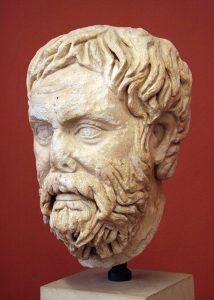 Branch: Epistemology
Branch: Epistemology
Approach: Pyrrhonism
“He lead a life consistent with his doctrine, going out of his way for nothing, taking no precaution, but facing all risks as they came, whether carts, dogs or precipices…” – Diogenes Laertius (Life Of Pyrrho)Pyrrho of Elis remains one of the most mysterious and most illusive characters of ancient philosophy. He left no writings of his own, and so we must depend on the writings of his followers, like Timon of Phlius, to gain an insight into his very unique school of thought. Additionally, many accounts of his life are given to us as entertaining anecdotes. It was said that once Pyrrho came to accept that any form of knowledge was
impossible, he never again relied on his senses to survey his environment.
And so we hear stories of Pyrrho walking carelessly into a busy street or wandering dangerously close to the edge of perilous cliffs. It was said that it was only through the diligence of his followers, who would regularly pull him away from oncoming danger, did he not meet an untimely demise.
The stories regarding Pyrrho seem so outrageous that we might rightly be skeptical (see what I did there?) and perhaps it would be best to accept these stories with a grain of salt. We can be reasonably sure that Pyrrho began his life in the city of Elis, located in southern Greece on the Ionian Sea. Diogenes Laertius, the great biographer of the philosophers, tells us that Pyrrho first found a career as a painter and that his paintings could be see in the gymnasium at Elis.
Pyrrho was diverted to philosophy as a younger man and would spend years traveling the known world. Finding his way into the company of Alexander The Great, Pyrrho went so far as to travel to India and Persia, learning from the various magi and philosophers he encountered along the way. Pyrrho’s delve into the eastern world would come to be very important when the time came for the philosopher to develop his own teachings. Pyrrhonism, as it would come to be called, was highly influenced by eastern philosophy and would emphasize finding inner peace through an educated form of blissful ignorance.
After his travels, Pyrrho returned to Elis where he would live the remainder of his life seeking solitude and shunning many forms of material wealth. Still, he was highly honored by his city. Elis would name Pyrrho as a high priest of the city and would not impose taxes upon philosophers as a consequence of their respect for the man. Athens would also grant Pyrrho honorary citizenship.
he was highly honored by his city. Elis would name Pyrrho as a high priest of the city and would not impose taxes upon philosophers as a consequence of their respect for the man. Athens would also grant Pyrrho honorary citizenship.
 he was highly honored by his city. Elis would name Pyrrho as a high priest of the city and would not impose taxes upon philosophers as a consequence of their respect for the man. Athens would also grant Pyrrho honorary citizenship.
he was highly honored by his city. Elis would name Pyrrho as a high priest of the city and would not impose taxes upon philosophers as a consequence of their respect for the man. Athens would also grant Pyrrho honorary citizenship.Pyrrho would live to see old age. According to Diogenes Laertius, he would died at the ripe old age of ninety. Sometimes referred to as the father of skepticism, Pyrrho left no writings of his own. That task would be left to other thinkers including his pupil Timon of Philius and the Greek physician Sextus Empiricus in his essays “Outlines Of Pyrrhonism”. A very unique school of thought, Pyrrhonism could either be considered an eloquent lesson on finding inner peace or absolute madness. The answer is anybody’s guess.










4 comments
Where is Thesus and minotor , Daedalus and Icarus , Story of Narcissus
They dont have all of the Mythical Creatures like , BRUH , do all of the Mythical Creatures
What an absolute misunderstanding of Pyrrhonism. Pyrrho would never have been caught dead making a statement like all knowledge is impossible. His entire point was suspension of belief. Each thing is neither more this than that. At this point, it appears that we don’t know if truth is obtainable or not so the only path for certainty is to suspend judgement. And he certainly used his senses to survey his environment. Those stories are only slander by the dogmatists he slighted at the time. When you suspend judgement, you invariably rely on appearance alone. Grass Appears green. Honey appears to taste sweet. That cliff appears deadly. Without making assertions on the reality of the matter, Pyrrho navigated life using these appearances. Grass may or not be green to everyone. Honey may or may not taste sweet. That cliff may or may not kill you.
Good list, but Python should be at least in the top three.
Trackbacks
Our apologies, you must be logged in to post a comment.